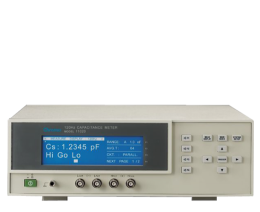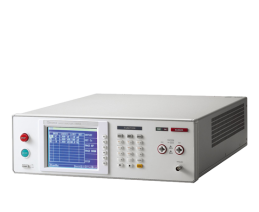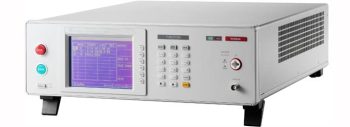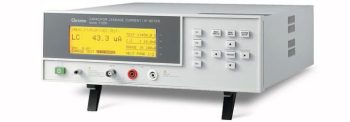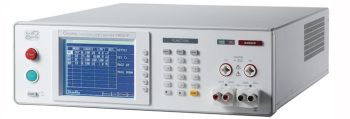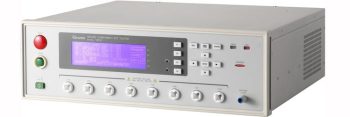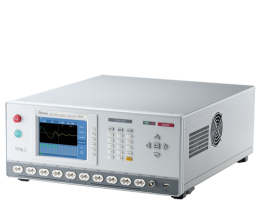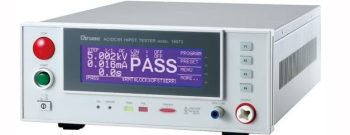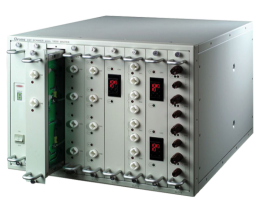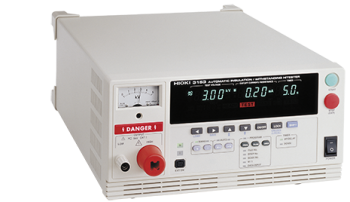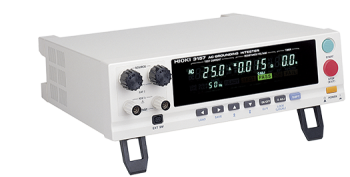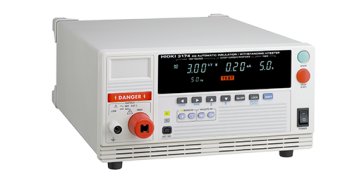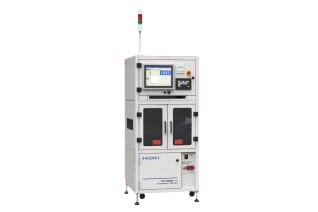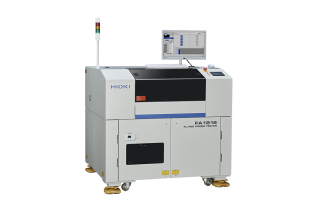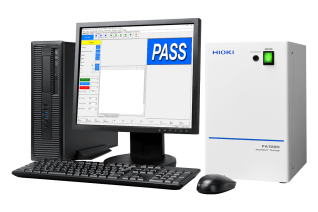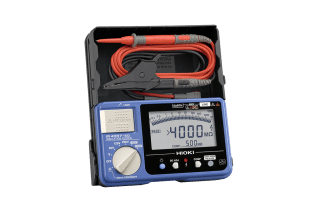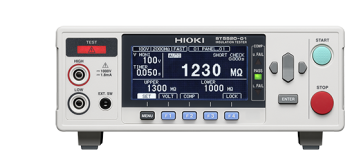Electrical Safety /
Insulation Resistance Testers
Insulation resistance testers are electrical testing devices that measure the resistance of insulation materials used in electrical equipment and systems. These testers are used to ensure that the insulation materials are working effectively and that there are no breaks or faults in the insulation. Insulation resistance testing is an important part of preventive maintenance for electrical equipment, as it helps to identify potential problems before they cause serious damage. Insulation resistance testers are commonly used in industries such as electrical, telecommunications, and automotive. They can be used to test a wide range of equipment, including transformers, motors, generators, cables, and switchgear. Insulation resistance testing is also important in the construction industry, where it is used to check the effectiveness of building insulation materials. Insulation resistance testers typically use a high voltage DC source to apply a voltage to the insulation material being tested. The tester then measures the current flowing through the material, and calculates the resistance. This resistance value is used to determine the quality of the insulation material. Some testers also have additional features, such as a built-in voltmeter or a data logger, which can help to make testing more efficient. Using an insulation resistance tester is a crucial part of maintaining the safety and reliability of electrical equipment. Regular testing can help to prevent equipment failure and minimize the risk of electrical accidents. Insulation resistance testers are available in a range of sizes and capabilities, and can be used by both professionals and amateurs alike. If you need to test the insulation of your electrical equipment, an insulation resistance tester is a valuable tool to have.
Insulation resistance testers are electrical testing devices that measure the resistance of insulation materials used in electrical equipment and systems. These testers are used to ensure that the insulation materials…
...are working effectively and that there are no breaks or faults in the insulation. Insulation resistance testing is an important part of preventive maintenance for electrical equipment, as it helps to identify potential problems before they cause serious damage.
Insulation resistance testers are commonly used in industries such as electrical, telecommunications, and automotive. They can be used to test a wide range of equipment, including transformers, motors, generators, cables, and switchgear. Insulation resistance testing is also important in the construction industry, where it is used to check the effectiveness of building insulation materials.
Insulation resistance testers typically use a high voltage DC source to apply a voltage to the insulation material being tested. The tester then measures the current flowing through the material, and calculates the resistance. This resistance value is used to determine the quality of the insulation material. Some testers also have additional features, such as a built-in voltmeter or a data logger, which can help to make testing more efficient.
Using an insulation resistance tester is a crucial part of maintaining the safety and reliability of electrical equipment. Regular testing can help to prevent equipment failure and minimize the risk of electrical accidents. Insulation resistance testers are available in a range of sizes and capabilities, and can be used by both professionals and amateurs alike. If you need to test the insulation of your electrical equipment, an insulation resistance tester is a valuable tool to have.
-
The Chroma 11020 Capacitance Meter is a high-speed precision Capacitance Meter. It provides 100Hz, 120Hz, and 1kHz test frequencies. Measurement time...FIND OUT MORE
-
Chroma 11210 battery cell insulation tester is an instrument used for accurately measuring leakage current (LC) and insulation resistance (IR) of...FIND OUT MORE
-
FUNCTIONS Hi-Pot – AC 5kV/100mA – DC 6kV/20mA. Insulation – 5kVmax – 1MΩ-50GΩ. APPLICATIONS Motors : The 19055...FIND OUT MORE
-
The Chroma 19056/19057 Hipot Analyzer is an equipment specially designed for testing and analyzing ultra-high withstand voltage. The series of models...FIND OUT MORE
-
FUNCTIONS Supports electrical safety tests and function test scanning : – AC/DC WV Test, – IR Test – GB Test, LC Test (all...FIND OUT MORE
-
The latest safety standards for medical equipment are very strict and because the medical equipment is in constant use by medical staff for patient...FIND OUT MORE
-
The Chroma 11200 CLC/IR is Chroma’s newest digital leakage current meter. It provides DC 1-650 V, 0.5mA-500mA (150mA for V>100V) DC power...FIND OUT MORE
-
The Chroma 19032 /19032-P is a 5 in 1 Production Safety Analyzer. It can perform AC/DC Hipot, insulation resistance, grounding resistance and dynamic...FIND OUT MORE
-
The quality verification test items for Wound Component consist of AC/DC Hipot tests, Insulation Resistance (IR) test and Impulse Winding test....FIND OUT MORE
-
The Chroma 19036 is the industry’s first test device that combines the functions of impulse tester and hipot analyzer for testing the impulses of...FIND OUT MORE
-
The Chroma 19070 series are the smallest Hipot Testers currently available in the world. Its super mini size is easy to carry and the large LCD...FIND OUT MORE
-
The Chroma 19200 can perform high / low voltage switch and scan all safety tests by EST Analyser (Chroma 19032) inputs such as withstanding test;...FIND OUT MORE
-
The Hioki electrical safety testers are designed for insulation resistance and voltage withstand testing of electrical devices and components...FIND OUT MORE
-
The Hioki 3157 AC Grounding HiTester is an AC ground bond tester designed for protection circuit testing of a wide range of electrical equipment....FIND OUT MORE
-
The AC Automatic Insulation/Withstanding Tester Hioki 3174 is a low-cost solution featuring contact check functionality as well as a stabilized power...FIND OUT MORE
-
Introducing the Hioki FA12202-11 In-Circuit Tester, the ultimate solution for populated circuit board testing! This inline automatic testing system...FIND OUT MORE
-
Introducing the HIOKI FA1816 Flying Probe Tester – the ultimate solution for accurate and efficient PCB and substrate inspection. Our equipment...FIND OUT MORE
-
Introducing the Hioki In-Circuit Tester FA1220, the perfect solution for conducting functional tests of individual electronic circuit board...FIND OUT MORE
-
Introducing Hioki Insulation Testers or Megohmmeters, designed for field insulation testing with an all-in-one design that features built-in rugged...FIND OUT MORE
-
The Hioki electrical safety testers are designed for insulation resistance and voltage withstand testing of electrical devices and components...FIND OUT MORE

